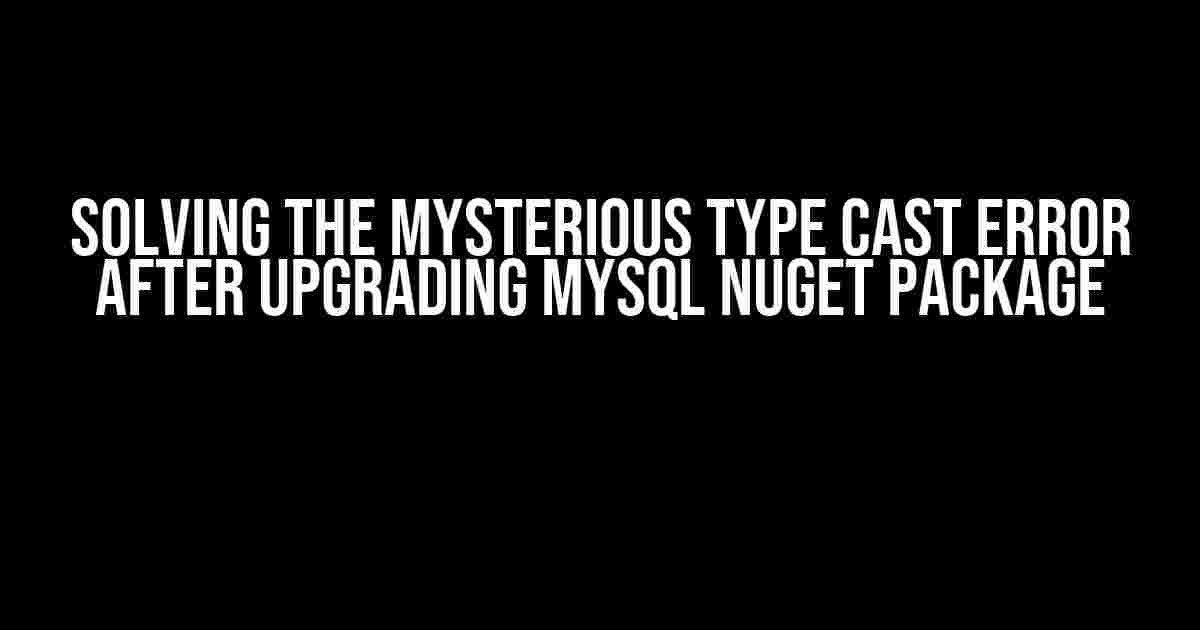Are you tired of seeing the frustrating “Type cast error” message after upgrading your MySQL NuGet package to the latest version? You’re not alone! Many developers have faced this issue, and in this article, we’ll guide you through the troubleshooting process to get your project up and running smoothly again.
The Symptom: Type Cast Error
The error message usually looks something like this:
SqlException: Unable to cast object of type 'MySql.Data.Types.MySqlDateTime' to type 'System.DateTime'.
This error occurs when the MySQL NuGet package is unable to convert a MySQL datetime type to a .NET DateTime type. But don’t worry, we’ll dive deeper into the reasons behind this error and provide a step-by-step solution to resolve it.
The Cause: Changes in MySQL NuGet Package
The latest version of the MySQL NuGet package introduces some breaking changes, specifically in how it handles datetime types. These changes can cause existing projects to throw the type cast error.
Here are some possible reasons for the error:
- Changes in the MySQL datetime type handling
- Incompatibility with certain .NET framework versions
- Conflicting NuGet package versions
The Solution: Updating Your Code and Configuration
To resolve the type cast error, you’ll need to update your code and configuration to work with the latest MySQL NuGet package. Follow these steps:
Step 1: Update Your MySQL NuGet Package
Make sure you’re using the latest version of the MySQL NuGet package. You can check for updates in the NuGet Package Manager:
Install-Package MySql.Data -Version 8.0.21
Step 2: Modify Your Data Access Code
Update your data access code to handle the new datetime type conversion:
using MySql.Data.MySqlClient;
using System;
// ...
MySqlCommand cmd = new MySqlCommand("SELECT * FROM mytable", conn);
MySqlDataReader reader = cmd.ExecuteReader();
while (reader.Read())
{
// Use the MySqlDateTime type explicitly
MySqlDateTime mysqlDateTime = reader.GetMySqlDateTime(0);
DateTime dateTime = mysqlDateTime.GetDateTime();
Console.WriteLine(dateTime);
}
Step 3: Configure the Connection String
Adjust your connection string to include the required settings:
Server=myServerAddress;Database=myDataBase;Uid=myUsername;Pwd=myPassword;
AllowZeroDateTime=True;ConvertZeroDateTime=True;DefaultCommandTimeout=0;
The `AllowZeroDateTime` and `ConvertZeroDateTime` settings are essential to handle datetime type conversions correctly.
Step 4: Verify .NET Framework Compatibility
Ensure that your project targets a compatible .NET framework version. The latest MySQL NuGet package supports .NET Framework 4.6.1 and above:
| .NET Framework Version | MySQL NuGet Package Version |
|---|---|
| .NET Framework 4.6.1 | 8.0.21 and above |
| .NET Framework 4.7.2 | 8.0.21 and above |
| .NET Core 2.1 | 8.0.21 and above |
| .NET Core 3.1 | 8.0.21 and above |
Additional Troubleshooting Tips
If you’re still experiencing issues, try the following:
- Check for conflicting NuGet package versions and update them to the latest version.
- Verify that your MySQL server version is compatible with the latest NuGet package version.
- Ensure that your project is set to use the correct .NET framework version.
Conclusion
Upgrading to the latest MySQL NuGet package can be a bit tricky, but by following these steps, you should be able to resolve the type cast error and get your project running smoothly again. Remember to update your code and configuration to work with the latest package, and don’t hesitate to reach out if you need further assistance.
Happy coding!
Frequently Asked Question
Are you stuck with a type cast error after upgrading your MySQL NuGet package to the latest version? Worry not, we’ve got you covered!
Q1: What could be the reason behind this type cast error after upgrading the MySQL NuGet package?
The most likely reason is that the latest version of the MySQL NuGet package may have introduced changes to the data type handling, which is causing the type cast error. It’s possible that the new version is more stringent about data type conversions, leading to this error.
Q2: How do I identify the specific line of code that’s causing the type cast error?
To identify the culprit, enable break-on-exception in your Visual Studio settings (Debug > Windows > Exception Settings). This will pause the execution at the exact line where the error occurs. You can then inspect the variables and types involved to determine the root cause.
Q3: Are there any workarounds to resolve the type cast error without downgrading the MySQL NuGet package?
Yes, you can try explicit casting, using the Convert.ToString() method or the MySqlDbType enum to specify the exact data type. This might help the compiler understand the intended type conversion. Additionally, review your database schema and adjust the column types if necessary to match the expected data types.
Q4: What are some best practices to avoid type cast errors in the future?
To avoid type cast errors, use explicit casting, validate data types before processing, and avoid implicit conversions. Also, ensure that your database schema is well-defined, and regularly review your code for potential type mismatches. Lastly, keep your MySQL NuGet package up-to-date, as newer versions often include bug fixes and improvements.
Q5: What if none of the above solutions work, and I’m still stuck with the type cast error?
If all else fails, consider creating a minimal reproducible example (MRE) and report the issue on the MySQL NuGet package’s GitHub page or forums. This will help the maintainers identify and fix the issue. You can also seek help from online communities or consulting experts in the field.
